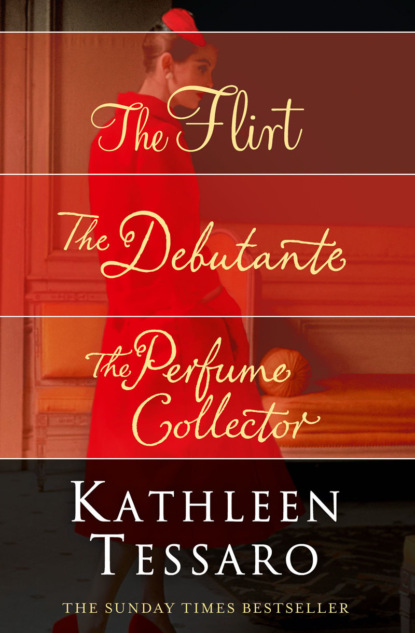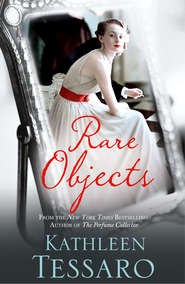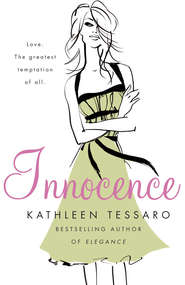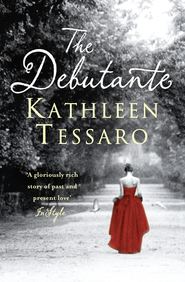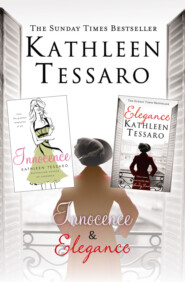По всем вопросам обращайтесь на: info@litportal.ru
(©) 2003-2024.
✖
Kathleen Tessaro 3-Book Collection: The Flirt, The Debutante, The Perfume Collector
Настройки чтения
Размер шрифта
Высота строк
Поля
Henry’s gaze was far off, on some distant landmark. ‘I loved a girl. Once,’ he added wistfully.
‘What happened?’
But Henry didn’t answer.
Instead he patted Hughie on the back. ‘Some day you’ll understand. See, being a flirt is a vocation. A calling. We flirt, young Smythe, because others cannot. And we have the ability to foster love only because we’re above it ourselves. But like all true vocations, it involves sacrifice and discipline.’
It sounded so noble. Hughie had never had a purpose in life. Henry’s words seeped through to his very core. Could it be that he was destined for a higher calling?
They walked on.
After a while Hughie asked, ‘So. How do you do it? What’s the trick?’
‘Do what?’ Henry paused to let a woman thunder past in her high heels, swinging her handbag violently to and fro like a weapon.
‘Flirt.’
‘The thing about flirting is not to think of it as flirting. The minute you do, it becomes contrived and false. The trick, if there is a trick, is just about noticing. Paying attention. What you say is secondary. And forget poetry. Simple things are best. Specific is good; it shows you’re really paying attention: “I’ve never seen such green eyes,” but not, “Your eyes are like two shining emeralds.” Women don’t want to be endlessly flattered. They want to feel as if you find it a pleasure to be with them.’
‘OK,’ Hughie’s brow knit. ‘So to flirt you try not to flirt but pay attention instead.’
‘There are three stages to any successful flirt; observing, making contact and re-framing … taking who they think they are and shaking it up a little. The matron wants to be told she’s sexy or avant-garde. The new mother wants to be told she’s handling it all seamlessly and hasn’t changed. The sophisticate wants to be told she’s delightfully unaffected, even charming. Your job is to see beyond the surface.’
‘And how do you do that?’
‘You’re keen!’ Henry laughed. ‘All right, then. The easiest way is to show you.’ And he led Hughie down Brook Street and into the grand lobby of Claridge’s Hotel.
They sat at one of the small round tables in the foyer, buzzing with the sudden rush of early-evening activity that tourists generate upon arriving back from a long day’s sightseeing. A string quartet was playing Mozart and the exotic ritual of high tea was just drawing to a close; hotels being the only place left where it was enacted in its entirety, like small historical dramas for people who had only read about it in books. Henry ordered them both a drink and then sat back, surveying the scene around him.
‘There,’ he said presently, pointing to a woman sitting with two young children at a table well away from the other guests. ‘What can you tell me about her?’
Hughie looked across the foyer. The woman was about forty-two, with dark shoulder-length hair, wearing a pair of tailored trousers and a stiff white shirt. Her hands were covered in rings; gold bracelets dangled from her wrists, a thick gold chain around her neck and a pair of matching, large earrings. Her face was carefully made up, too heavily for Hughie’s taste. She sat listlessly while the little girl and boy ducked in and around the table, arguing over a small electronic Game Boy. The table was set for high tea but, although the children’s plates bore the remains of half-eaten cakes, the woman’s was empty. A cup of black tea sat cooling in front of her and a pile of shopping bags from exclusive designer boutiques was stacked at her feet. The children, who were maybe five and seven, were dressed like two Ralph Lauren models, in pristine, almost Victorian children’s clothes. As the argument over the Game Boy became more animated, she winced and whispered something to them Hughie couldn’t hear. They looked up at her anxiously. Then the girl berated the boy, gave her brother a shove, and they both settled back sullenly into their seats.
‘Well, she’s married …’ Hughie began. ‘She’s got two children. She must be rich; she’s done a lot of shopping …’
‘How do you think she feels?’ Henry pressed.
Hughie narrowed his eyes. ‘Tired?’
Henry took another sip of his whisky and soda. ‘Is that all?’
‘I don’t know. Hungry?’
‘I’d say starving. But not just for food.’ He leant forward. ‘First off, she’s American. Probably from somewhere provincial, like the Midwest; definitely not from New York or LA. That’s why the children are dressed like extras from Mary Poppins and her make-up is ten, no, more like fifteen years, behind the times.’
Hughie was amazed. ‘How can you tell?’
‘You get a feel for these things. It’s easy to tell she’s not European; there’s nothing at all natural about her.’
‘Oh.’
‘Secondly,’ he continued, ‘she’s married a wealthy man but doesn’t have a job of her own. It’s unlikely the money is hers. Independently wealthy women don’t spend money in such an obvious way. They buy things, of course. But what you see here is revenge shopping. She’s spending her husband’s money, piling up as many bags as she can in order to take what she can from him.’
‘She could have a job,’ Hughie felt a sudden desire to defend her against Henry’s razor-sharp evaluation.
‘See how her hair doesn’t move with her head? That’s because it’s been blow-dried every other day. Working women don’t have time for that, or for the freshly manicured nails.’
‘I see.’ Hughie felt suitably chastened.
‘She’s bored, depressed and, if I’m not mistaken, hasn’t even seen her husband recently let alone had any romantic attention from him.’ He leant forward. ‘See how she’s wearing half of the Bulgari collection? A sure sign of low self-esteem. Too much jewellery, too much make-up; these things are like armour for women. She obviously thinks she has something to hide. So, what does she need?’
Hughie smiled wanly. ‘A good therapist?’
Henry sighed. ‘From you.’
Hughie looked at her again. A waiter tried to clear the plates and she snapped at him, like a small dog whose tail had been stepped upon. The young man retreated and for a while she just sat, her fingers pressed over her eyes.
Something about her reminded him of his own mother, of the overwhelming sense of failure that seemed to follow her about like a cloud when he was small.
‘She needs to be told she’s good at something,’ Hughie said quietly.
Henry smiled. ‘That’s good. Very good. How do you think you might do that?’
Hughie took another gulp of his drink.
This was the best job he’d had in his entire life. But he was hopelessly out of his depth.
The little boy looked up and caught his eye. And before he knew quite what he was doing, Hughie stuck his tongue out at him.
The boy giggled.
Hughie pretended to ignore him and then glanced over again. This time the boy made a face and his sister squealed in delight.
Very slowly the dark-haired woman turned round.
‘I’m sorry,’ she said, in a soft drawl. ‘Are my children disturbing you?’
Hughie thought he caught a thin thread of fear in her voice. ‘No, not at all,’ he smiled. ‘Except for that one,’ he added, winking at the little boy. The child giggled again, squirming in his seat with glee.
‘Oh, he’s a terror!’ his mother agreed. And as she smiled, her eyes settled upon her son’s face. There was unmistakable tenderness in her expression.
She loves him, Hughie thought. Henry’s right: she’s just not that fond of herself.
‘Are you in town long?’ Henry asked, leaning in.
‘No, we go to Paris tomorrow and then Rome. I wanted the children to see Europe.’ She sounded wistful. ‘You know, Americans abroad,’ she added, almost apologetically.
‘Ah! A Grand Tour!’ Henry grinned. ‘There’s nothing like it!’





